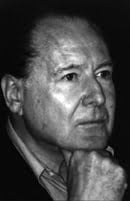
Gerhard Rühm
- Austria, Germany
- Zu Gast beim ilb: 2006
Gerhard Rühm was born in Vienna in 1930. He studied Piano and Composition at the Vienna Music Academy and became especially interested in twelve-tone music. Excited by these principles of composition, Rühm also dedicated himself to the visual arts and to literature. He found like-minded souls in H.C. Artmann and later Friedrich Achleitner, Konrad Bayer and Oswald Wiener, with all of whom he founded »The Vienna Group« in the mid-fifties. Within the history of literature the group stands for the renunciation of traditional literary conventions, especially the dominance enjoyed by the descriptive function of texts; they emphasised the materiality of language in their experimental and theoretical writings alike.
Rühm belongs to the classics of modern German-language literature. Scores of new genres, such as »visual music«, »auditory poetry« and »gestural drawing«, are among his wide-ranging, heterogenous work that emerges from the interface of literature, visual art and music. His work, which bears the influence of Expressionism and Dadaism, is often based on ready-made material taken from everyday life, which he then adapts using a particular formula. In a spirit of play, and without subjecting himself too rigidly to self-imposed rules, astounding, multi-layered effects of meaning emerge from an extreme concentration of means. These are situated on the pre-determined borders of silence and meaninglessness. One year after his first exhibition of visual works Rühm, alongside Achleitner and Artmann, published the volume of dialect poems »hosn rosn baa« (1959; t: trousers roses bones), a revival of regional poetry from the sentimental and the trivial. The difficulty of publishing his texts in Austria prompted him to move to Berlin in 1964. The first book to be published in Germany was the anthology »Die Wiener Gruppe« (1967; t: The Vienna Group), followed in swift succession by the volume of poetry »fenster« (1968; t: windows), »gesammelte gedichte und visuelle texte« (1970; t: collected poems and visual texts) and the prose collection »die frösche und andere texte« (1971; t: the frogs and other texts). Rühm engaged again and again in different forms of textual performance, making significant contributions to the »Neues Hörspiel« (New Radio Play), which focuses on sound as produced in the studio rather than on staged dialogues and actions. With »ophelia und die wörter« (1972; t: Ophelia and the words) Rühm experimented with the media of film and radio play. He was honoured with the Radio Play Prize of the War Blind for »wald. ein deutsches requiem« (1983; t: forest: a german requiem). To date he has received many more prizes, among them the Austrian Literature Appreciation Prize, the Prize of the City of Vienna, the Grand Austrian State Prize and the Grillparzer Prize.
Rühm taught as Professor of Drawing at the Academy of Visual Arts in Hamburg from 1978 to 1993. His visual work has been shown in numerous exhibitions. One year after the publication of »Was verschweigt die schwarze Witwe? Schrift-, Sprech- und Bildanagramme« (2004; t: What does the black widow conceal: Written, spoken and pictorial anagrams), the editing of his ten volume collected works was embarked upon. The artist has lived in Cologne since 1975.
© internationales literaturfestival berlin
hosn rosn baa
[mit F. Achleitner und H.C. Artmann]
Frick
Wien, 1968
fenster
Rowohlt
Reinbek bei Hamburg, 1968
die frösche und andere texte
Rowohlt
Reinbek bei Hamburg, 1972
ophelia und die wörter
Luchterhand
Neuwied, 1972
wald. ein deutsches requiem [Tonband]
WDR
Köln, 1983
Die Wiener Gruppe [Hg.]
Rowohlt
Reinbek bei Hamburg, 1985
Visuelle Poesie
Haymon
Innsbruck, 1996
Masoch: eine visuelle Rezitation
Droschl
Graz, 2003
Was verschweigt die schwarze Witwe?
Droschl
Graz, 2004
Gesammelte Werke, Band 1 und 2
Parthas
Berlin, 2005, 2006
